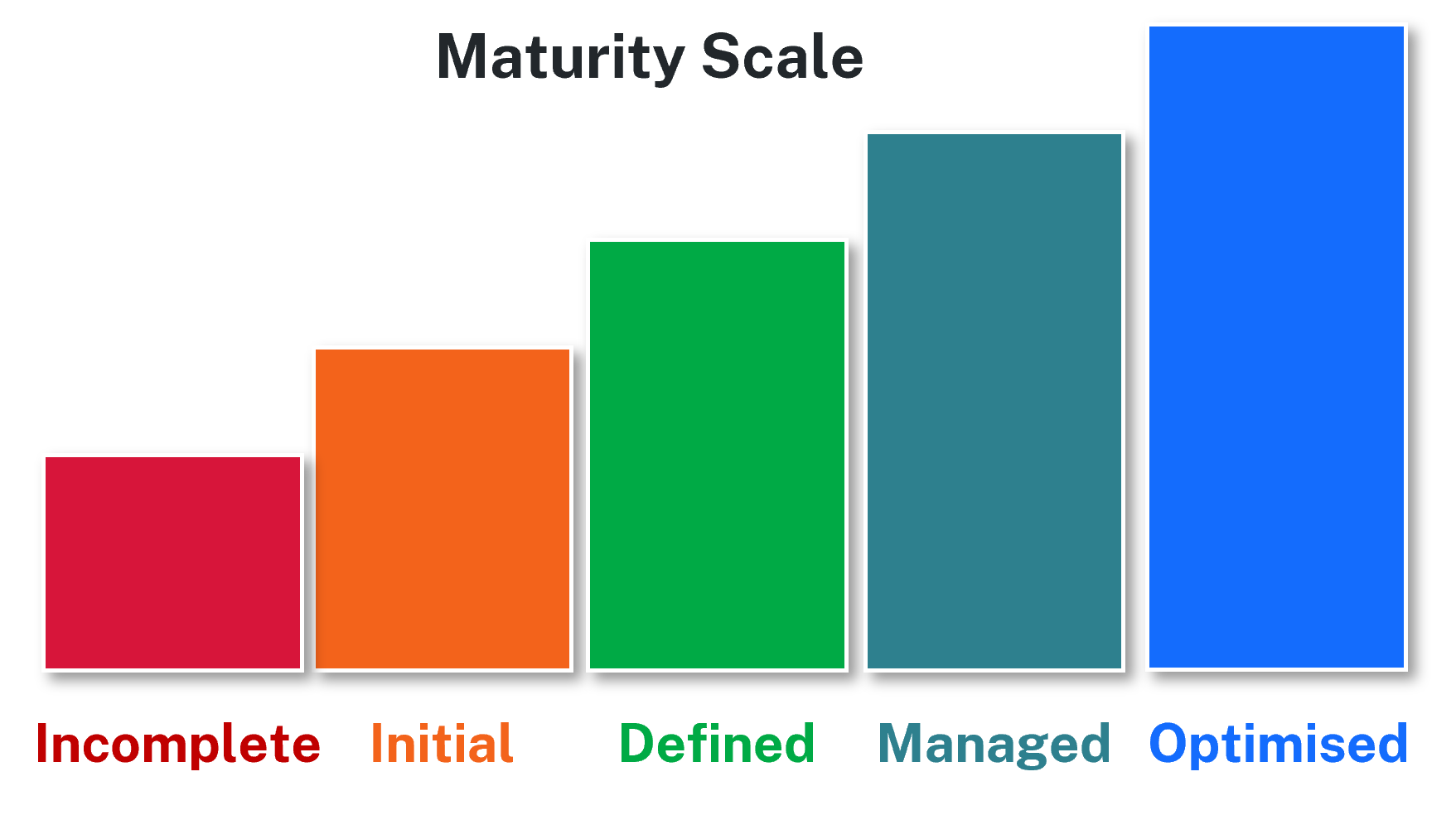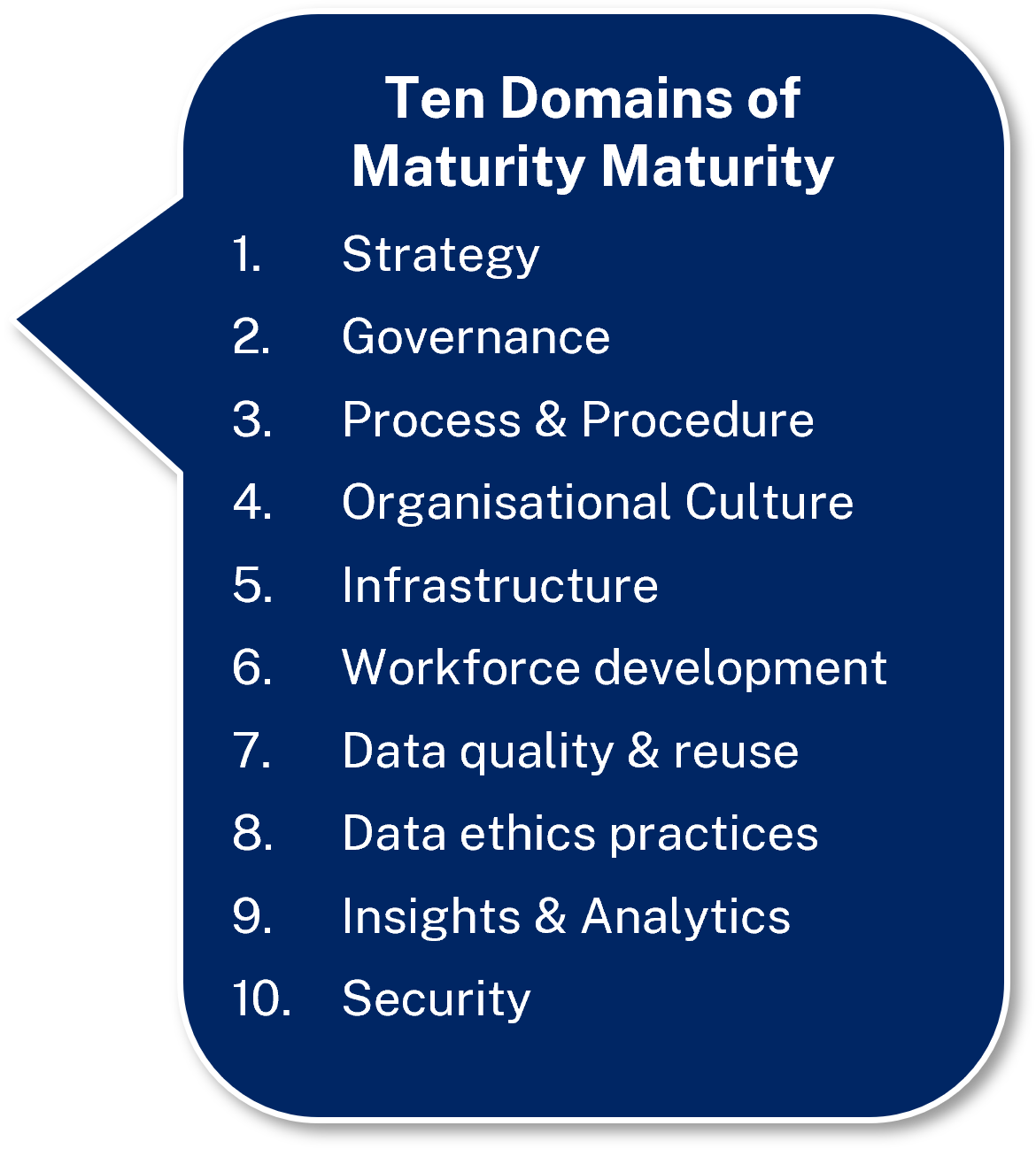How we’ll get there
4A: Shared approaches and tooling to support optimised data governance and management
Good data governance allows us to use data safely, efficiently and to the benefit of our community, economy and environment. By adopting common practices and standards, we can get greater value from our data. And we can be more efficient by sharing resources, infrastructure and knowledge.
 Diagram 4: Illustrative data maturity scale illustrating five progressive stages of data maturity, from incomplete through to optimised
Diagram 4: Illustrative data maturity scale illustrating five progressive stages of data maturity, from incomplete through to optimisedOur aim is to build data maturity to meet agency needs and enhance our cross-sector practices. We will develop an ongoing program of maturity improvement that addresses priority needs first.
The initial data maturity assessment conducted in 2024 showed that maturity is variable across domains and agencies, with room to uplift data maturity across the sector.
- Adopt common, interoperable data standards for use across agencies and their contractors
- Increase use of cross-sector data governance and management tools, including Metadata.NSW and Data Passport, and adoption of State Digital Assets, including NSW Spatial Digital Twin
- Measure and report on data maturity across the sector
- Share practice guides and capability resources to uplift data maturity
- Evaluate the appropriateness of the spatial data governance framework for use in other domains
- Identify opportunities to leverage existing data architecture solutions to reduce duplication and support interoperability
- The NSW Data Governance Toolkit streamlines data governance and boosts efficiency by equipping NSW Government agencies with tools and guidance to build robust data governance frameworks. The Toolkit is regularly updated to reflect evolving data needs, technologies, standards, and best practices.
- The Foundation Spatial Data Framework supports Government planning decisions by ensuring that commonly used spatial information is captured, stored, and disseminated in a way that guarantees quality, consistency, interoperability, and usability.
- NSW Government agencies are making it easier and faster to find, understand and access the right data, for example, through Enterprise Data Catalogues (EDC). Agency EDCs uplifts data maturity by providing a centralised, self-service platform with robust data governance tools and processes to improve data management and sharing.
- The Metadata.NSW Registry is a centralised repository of over 15,000 metadata items across NSW Government, making it easier for users to search, identify and access relevant human services data across multiple agencies. The Registry acts as a data governance tool by ensuring data elements are defined, consistent and easy to interpret, improving data management, integration, and analysis across NSW Government.
- The NSW Data Passport makes it easier, faster and safer for government and non-government researchers to access over 60 human services data assets and insights through an online accreditation process, meaning users only need to demonstrate they are a ‘safe user’ once rather than multiple times.
The NSW Government released a State Digital Asset Reuse Policy13 in October 2023 to support the delivery of social, environmental and productivity benefits through fewer and better systems.
More than one dozen NSW Government agencies are using the Advanced Analytics Services platform, utilising a ‘build once use many’ approach.

Buy NSW
Enterprise Data Catalogue
Data Passport
Asset Information Strategy
Edulake
Net Zero Accelerator
Low-cost themed hub service
Domain driven data architecture
4B: Build sustainable funding options to increase data maturity across the sector
Government’s resources must be used efficiently and effectively. Taking a cross-government approach to data maturity opens opportunities to reduce duplication, coordinate our efforts and leverage economies of scale.
This includes sharing knowledge and resources, building capability in cross-government priority areas and collaborating to leverage greater value when investing in infrastructure, platforms and tools.
Our goal is to collaborate to invest in our people, resources and infrastructure to target priority areas and deliver greater value for money.
- Recommend an approach to cross-sector investment in people, infrastructure and resources that enable data capability, capacity and quality uplift
- Coordinate procurement of data governance and management platforms and tools
- The Advanced Secure Analytics Lab (A-SAL) provides a secure environment to examine and analyse data. A-SAL is a state-of-the-art platform providing secure environments for collaboration and advanced analysis of sensitive data while adhering to rigorous security and compliance standards. It allows data analysts from within and outside government to access data generate insights for use in data-driven decision-making.
- The NSW Government supports agencies through centralised services and platforms to deliver cross sector benefit. An example of this is Data After Dark, a central digital platform which integrates a wide range of data that are critical to assess the performance of the night-time economy across NSW.
- The NSW Government has developed the NSW Data Cloud, making it faster and easier for agencies to find, request and share data and insights across government safely and securely with individuals and groups. The NSW Data Cloud, now in the piloting phase, is a self-service data sharing platform which complements NSW Government’s existing data cataloguing, metadata, and data request platforms (e.g. Metadata.NSW and NSW Data Passport).

 Diagram 3: Ten Domains of Data Maturity covered in a baseline data maturity assessment of agencies across NSW Government
Diagram 3: Ten Domains of Data Maturity covered in a baseline data maturity assessment of agencies across NSW Government